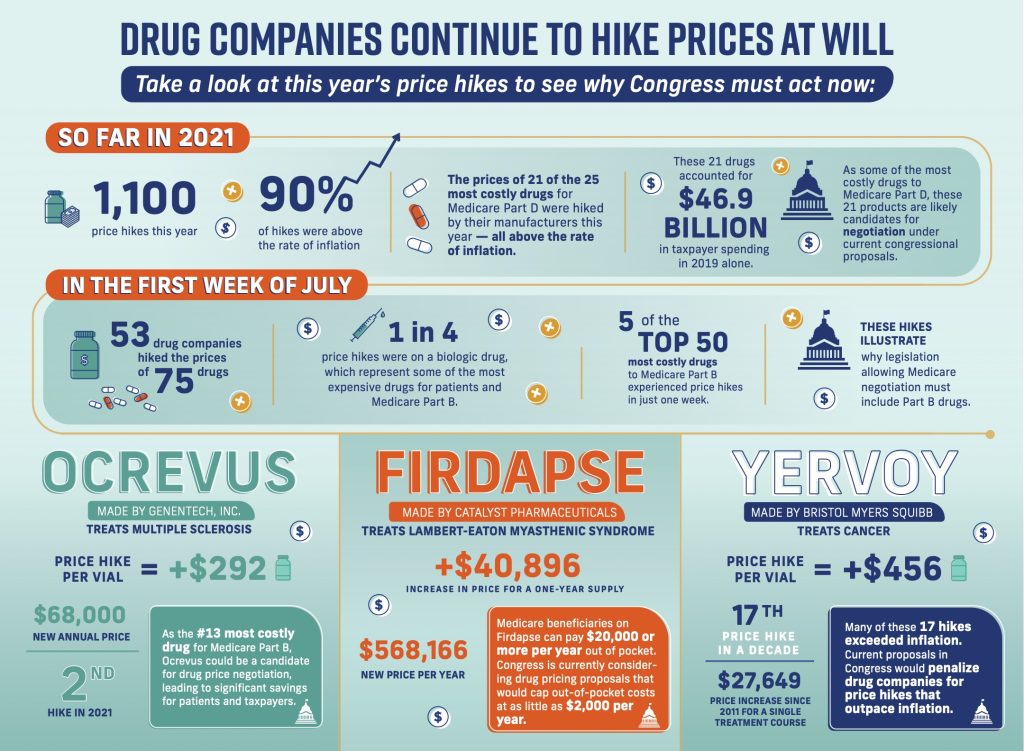| WASHINGTON, D.C. — As the drug industry continues to hike drug prices at will, a new analysis from Patients For Affordable Drugs gives evidence of the urgent need for Congress to lower drug prices by allowing Medicare to negotiate directly with drug companies. The analysis explores more than 1,000 price hikes since the beginning of 2021 and digs into how the July increases on three drugs — Ocrevus, Firdapse, and Yervoy — provide specific examples of why Congress must pass proposals to allow Medicare to negotiate lower prices for both Parts B and D drugs, cap out-of-pocket costs, and crack down on drug company price gouging.
“Drug corporations are doing what they do best: raising prescription drug prices as high as they think they can without regard to the impact on patients,” said David Mitchell, a cancer patient and founder of Patients For Affordable Drugs. “It doesn’t have to be this way. There are proposals in Congress right now to rein in Big Pharma’s unfettered pricing power by allowing Medicare to negotiate lower prices, capping out-of-pocket costs for patients, and penalizing companies for hiking prices above the rate of inflation. Patients need relief now.”
So far in 2021, 1,100 price hikes have occurred, 90 percent of which were above the rate of inflation. Drug companies raised prices on 21 of the 25 costliest drugs for Medicare Part D, all blockbuster products that are likely candidates for price negotiation under current congressional proposals. In 2019 alone, these 21 drugs accounted for $46.9 billion in taxpayer spending.
“A quarter of this month’s price hikes were on biologic drugs, which are some of the most expensive drugs for patients and Medicare Part B,” Mitchell continued. “Congress has the power to change that with Medicare negotiation legislation that applies to all drugs and extends the lower prices to all Americans.”
In the first week of July alone, 53 drug companies hiked the price of 75 drugs, including five of the top 50 most costly drugs to Medicare Part B.
The new analysis examines three drugs with July price increases that highlight the need for congressional action:
- Ocrevus, a multiple sclerosis drug made by Genentech, increased in price by $292 per vial, bringing the new annual price to $68,000.
- Firdapse, a Lambert-Eaton myasthenic syndrome drug made by Catalyst Pharmaceuticals, increased in price by $40,896 for a one-year supply, bringing the new annual price to $568,166.
- Yervoy, a cancer drug made by Bristol Myers Squibb, increased in price by $456 per vial. This is the drug’s 17th price hike in a decade, adding up to a total price increase of $27,649 since 2011 for a single treatment course.
“The price of the drug that gives me the best chance at preserving my cognitive and motor functions has increased twice this year without clinical reason or rationale,” said P4AD Digital Director Tori Saylor, who lives with multiple sclerosis and receives Ocrevus to delay the progression of her disease. “As the 13th most costly drug for Medicare Part B, Ocrevus could be a candidate for drug price negotiation, bringing real relief to patients like me. It’s time for Congress to act.”
Legislation to allow Medicare negotiation, cap out-of-pocket costs for patients, and rein in price hikes is under consideration in both the Senate and the House of Representatives. Senate Finance Committee Chairman Ron Wyden recently releasedhis guiding principles for drug pricing reform, which are expected to be considered for inclusion in the Democrats’ reconciliation budget package later this year. In the House of Representatives, H.R. 3, which would allow Medicare to negotiate drug prices in both Parts B and D, was reintroduced in April.
View the full analysis below and here. The methodology can be found here.

|